Clearsprings: Migrant Camp Profiteers
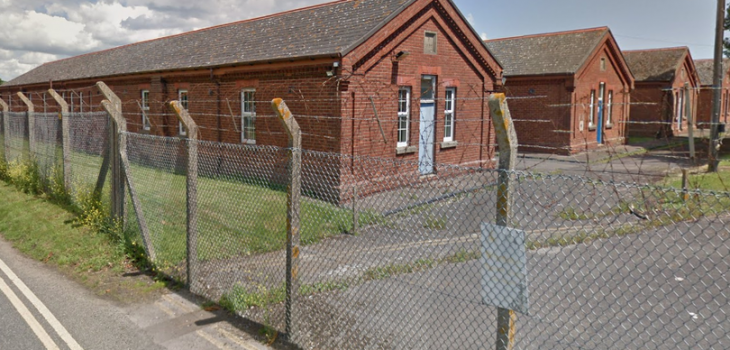
The government has hastily-adapted military bases into camps to hold people who have just crossed the channel to get to the UK. Refugees and local volunteers have been speaking out about the camps and the grim conditions inside.
The Home Office has contracted management of the camps to Clearsprings, an Essex-based private company. Though not as well known as other Home Office outsourcers such as Serco and G4S, it has made millions from asylum housing over the last 20 years.

In response to requests, we have looked into Clearsprings, its track record and the people behind it. We have found:
Clearsprings is owned and controlled by Graham King, an Essex businessman who has a range of other interests including consultancy services, caravan parks and taxi firms.
Housing provided by the company has repeatedly been found to be substandard, with leaking plumbing, damp, broken fire alarms and electrical sockets, and infestations of cockroaches, rats and mice. In one notorious episode, Clearsprings was slammed for making asylum seekers in Cardiff wear red wristbands to identify themselves.
Other controversies include a tax dispute with HMRC and a King-owned caravan park accused of profiting from homeless people.
Clearsprings’ boss has been paid at least £4 million over the last five years.
After the Home Office, Clearsprings’ other main customer is Kent County Council.
Daily management in Napier Barracks is subcontracted by Clearsprings to Nationwide Accommodation Services, an East London property management firm that works for a number of local authorities.
Is there a company you think we should be looking into? Click here to get in touch.
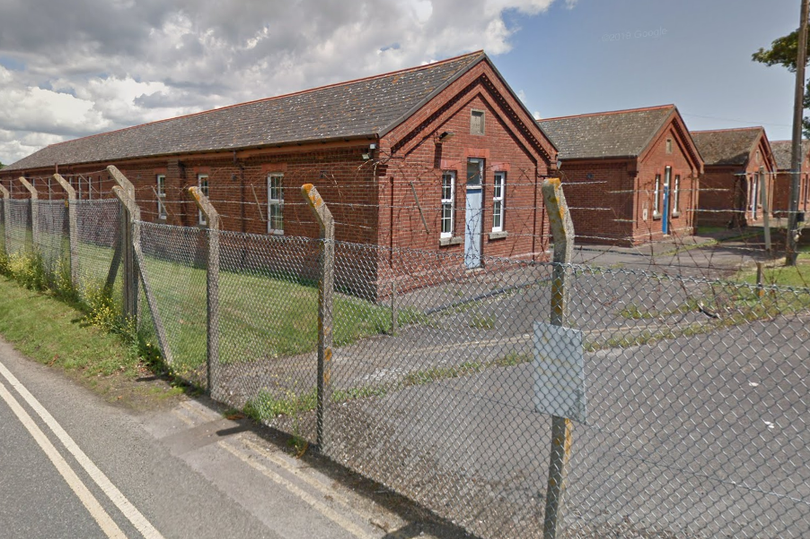
The Napier Barracks. Image from Google Maps
Military camps: a new low for UK immigration policy
The UK Government has opened two unused military bases as camps to hold migrants arriving from across the channel. The Napier Barracks, near Folkestone in Kent, has room for 400 people. The Penally Training Centre near Tenby, in Pembrokeshire in Wales, can house 250. Both are part of the Ministry of Defence’s “training estate”, being leased to the Home Office. People housed at the camp are commonly from Eritrea, Iran and Sudan with smaller numbers from Kurdistan, Iraq, Afghanistan, Syria, Turkey, Palestine, Ethopia and other African countries.
Using military bases as refugee camps is common practice in many countries – notably Greece, where the army runs many of the “reception and identification camps” used to warehouse people who’ve crossed the Aegean Sea or the Evros Valley. But it’s an unusual step for the UK, bringing to mind wartime internment centres or the film Children of Men – in which refugees are penned in a concentration camp 50 miles down the coast from Folkestone at Bexhill-on-Sea.
So what lay behind this new policy? It may play well with politicians’ key audience of anti-migrant target voters: after the plans were announced in September, a Daily Mail op-ed from Sue Reid cheered a “sensational move by the Government” that is “determined to end criticism of Britain being a soft touch for migrants”. Although there has also been right-wing backlash after local ‘not in my back yard’ protests – meaning those both for and against supporting refugees may oppose the camps.
As a Home Office PR “sensation”, it is part of the latest anti-migrant media panic focused on the fact that thousands of people are now crossing the channel in small boats. In this context, the camps were announced alongside measures such as sending the Navy to patrol off Dover, and the rash of new deportation charter flights.
Grimness and resistance
Speaking in September, a Clearsprings manager said the camps would have TVs, wifi and sports equipment to keep people entertained, interpreters, information provided in several languages, plus sanitisers, masks and security.
We have gathered information from residents that suggests conditions are far more grim than that suggests. Men in the camp told us up to 14 people are made to share rooms together, even with cases of Covid-19 confirmed among residents. They hang sheets up between them for some privacy and dignity. No clothing is supplied with residents often still wearing the same clothes they crossed the channel in. Many have to share shoes between them.
The spread of Covid-19 is a constant concern. Residents complain of a lack of hand soap dispensers, crowded washing facilities and little social distancing. People think it’s only a matter of time till more get sick with COVID-19. There is a nurse on site five days a week, yet residents complained to us of not getting the treatment they needed. One man said: “I had an infection so I went to the nurse. I was told this country does not have any money to pay for my medical treatment.”
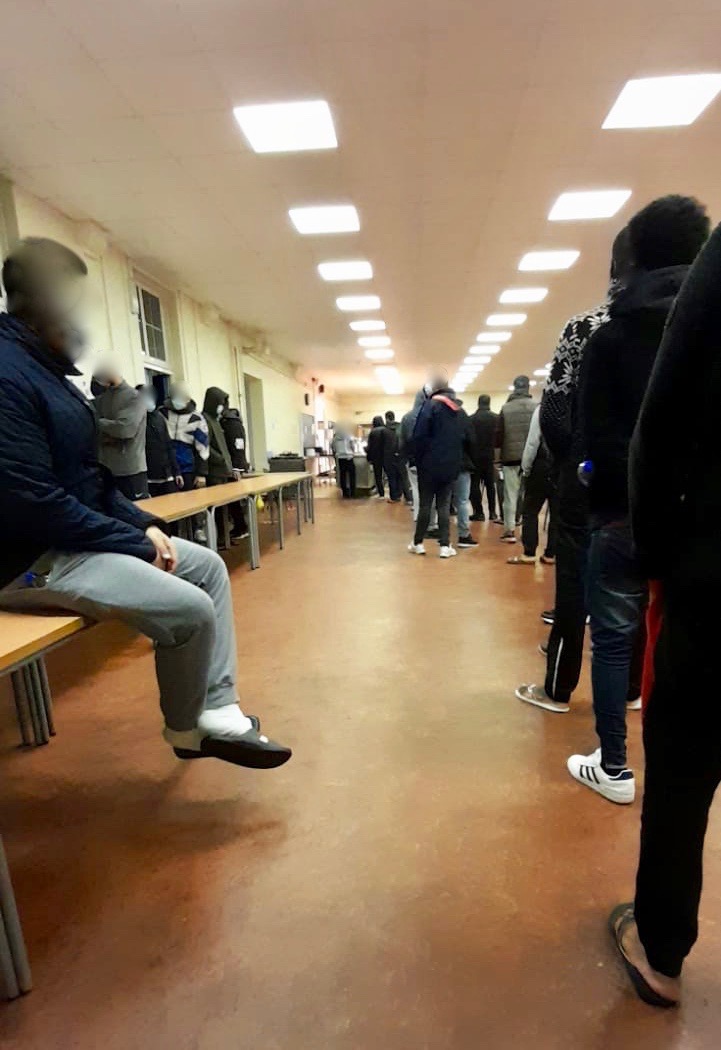
Residents, all of whom asked to stay anonymous, complain of the camp being like a prison. Far Right groups have protested outside during its opening and continue to agitate online. Although there have also been many demonstrations of welcome, with more than 200 people mobilising in a counter-demonstration to the Far Right in Kent. People inside, many of who fled conflict and dangerous situations, are suffering from stress and depression but there is little mental health support available to them. One man told us:
“I worry about the people who spend the whole day in bed. They wake up to eat and then go back to bed. They do not speak to anyone, they cannot speak English nor do they have a phone or anything. There are people like this in every building. I tried to get someone to use my phone to speak to his family but he didn’t know how.”
In general, reports show an institution ill-prepared for the diverse needs of its residents. For example, some of the staff in the Napier barracks do speak Arabic, but a third of residents don’t speak English or Arabic and as a result find communication far more difficult (though some residents said they were supporting others to learn). We were told residents claiming asylum because of being LGBTQ+ feel particularly vulnerable, worried those around them may share the prejudices they fled.
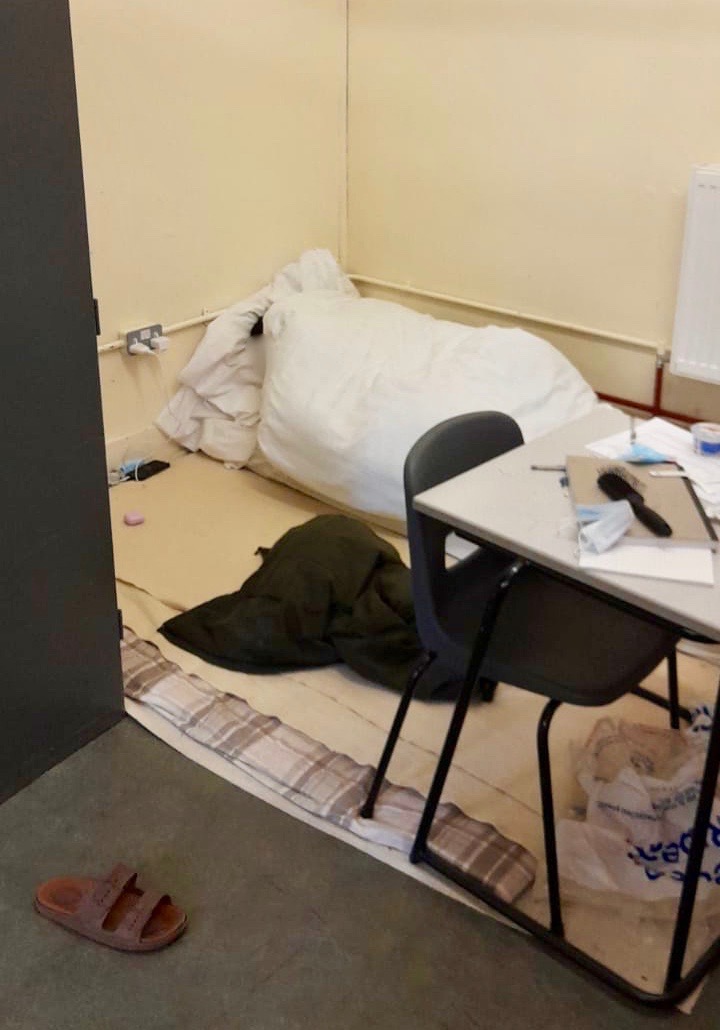
In response to the situation, local volunteers have formed networks to support residents inside the camps. Another complaint is not being given access to a lawyer, and some volunteers are concerned the Home Office is using the barracks as a holding space to enable more deportations before the end of the year. On 23 November, 14 people were taken from the camp to be deported.
Public concern is growing about the camps and the conditions inside them. Rather than address these concerns, Clearsprings has asked local volunteers to sign confidentiality agreements underpinned by the Official Secrets Act so they can’t talk about what they sees.
In Penally, reports suggest the situation for people inside the camps is similarly grim, with the camp targeted by far right protests. In response to their situation, residents have formed a union called ‘Camp Residents of Penally’ to “work democratically, transparently and fairly, to include and empower” residents, and to engage with Clearsprings, the Welsh government and the Home Office. Learning the Welsh language of the local area is a key goal, part of an aim to “meet their own needs and benefit the wider organisation”.
Clearsprings’ record
The Napier and Penally camps are both run by Clearsprings, a private company based in Rayleigh, Essex, that runs asylum accommodation for the Home Office in the South of England and Wales. The rest of the UK is contracted out to notorious outsourcer Serco – currently making millions from the failing Test and Trace system – and Mears Group, which has achieved particular notoriety in Scotland less than a year into its contract.
The business model is simple. The companies receive regular fees from the Home Office, then try to find the cheapest accommodation possible from local landlords and sub-contractors, with a bare minimum of management and maintenance, to maximise the “cut” they take. The result is thousands of people dumped in damp, squalid, rat and cockroach infested slum housing.
Clearsprings has not received the same media attention as Serco, Mears or G4S – which also used to run asylum housing. But it has been in the asylum housing business for close to 20 years and had a pretty grim track record, even before it took over the new camps. Here are just a few stories about Clearsprings’ asylum housing from the last five years that have made the news:
2020: BBC reports on “sudden and unexplained death” of a 3 year old child in Clearsprings accommodation in Wales.
2019: The Guardian exposes how hundreds of refugees are crammed into a number of hostels in Southall, London, which are “overrun with cockroaches, rats and mice”. Clearsprings manages the hostels through a subcontractor called “Mylondonlets.co.uk”.
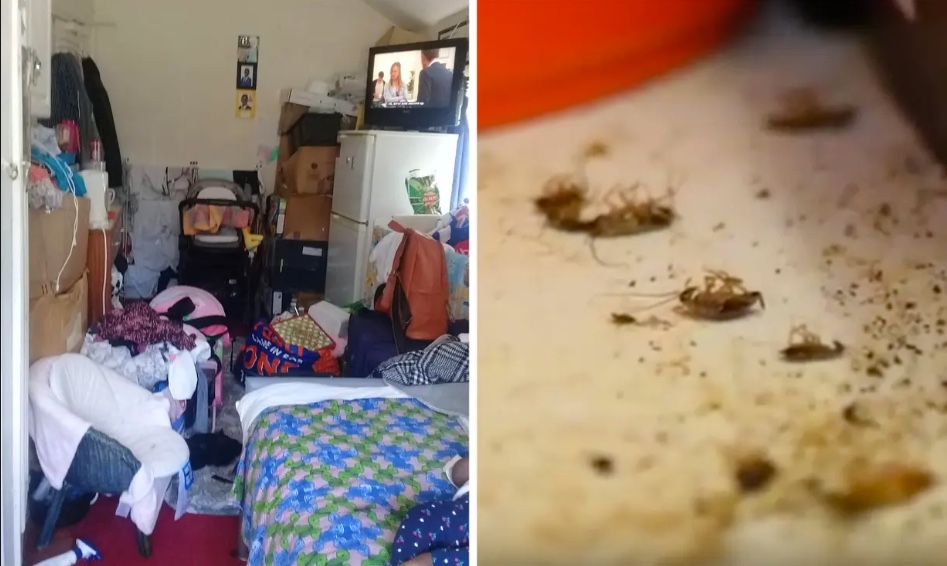
Cockroaches and overcrowding in a flat for asylum seekers provided by Home Office contractors. The room on the left is shared by three people. Image from: https://www.theguardian.com/world/2019/aug/20/asylum-seekers-crammed-into-cockroach-infested-accommodation-home-office#img-1
2017: Local media report complaints of more than 200 refugees crammed into “house of horrors” St Lawrence Mansions in Kilburn, London. People are made to sleep in rows of single beds in bug-infested building with one small shared kitchen.
2016: The Welsh Refugee Coalition highlights substandard conditions in Lynx House, Clearsprings’ Initial Accommodation hostel in Cardiff. Issues include “broken fire alarms, leaking plumbing, damp, and broken electrical sockets.”
2016: scandal in Wales as people staying in Initial Asylum accommodation in Cardiff are made to wear “coloured armbands” identifying them as asylum seekers. The policy was dropped after complaints including from the Welsh government’s first minister and Jewish organisations.
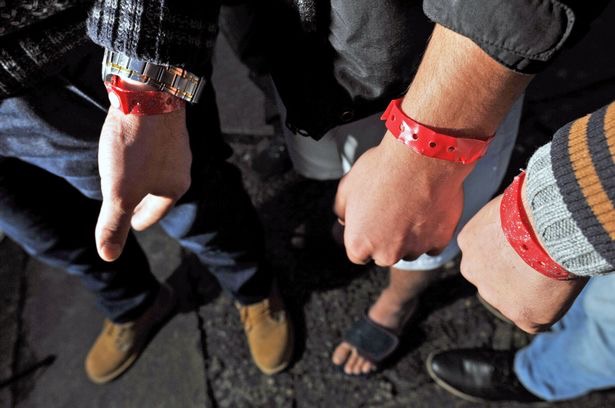
Asylum seekers having to wear red wrist bands in order to be served food at Lynx House, Newport Road, Cardiff. From: https://www.walesonline.co.uk/news/wales-news/chairman-company-runs-controversial-asylum-10864420
Following the money
None of these issues have stopped Clearsprings making good money from asylum housing. Accounts filed at Companies House show that Clearsprings Ready Homes Ltd – the full legal name of the company running the asylum contracts – was paid £68.7 million for its services in the year ending 31 January 2020.
Clearsprings makes its money as a housing outsourcer to central and local government. Its website lists UK Visas and Immigration, the Ministry of justice, Sunderland City Council, Plymouth City Council, Bristol City Council, Bradford City Council, Croydon Council, and the West London Housing Partnership as past customers.
But at the moment it seems to be effectively just an asylum profiteer. The current accounts state that its turnover comes mainly from the “provision of housing, support and transport to asylum seekers”. And they only mention two contracts: the Home Office asylum housing deal, which is set to run until 2029; and a local contract with Kent County Council, due to last until 2023.
While Clearsprings enjoys continuing Home Office’s support, it has found itself on HMRC’s naughty step. Clearsprings accounts from 2016 show the company had to pay £214,000 for a “settlement with HMRC regarding the group’s tax enquiries”.
Clearsprings made a profit of £796,000 from this business last year (2019). In total over the last five years Clearsprings Ready Homes has been paid £242 million and has turned this into a profit of £5.8 million.
What happens to this profit? The accounts show that the large majority of it – £4 million – has been paid out as dividends to a parent company called Clearsprings (Management) Ltd. This is directly owned by one man – Graham King.
Clearsprings Ready Homes Ltd revenue, profits and dividends 2016-20 (source: Companies House)
£’000s | 2019 | 2018 | 2017 | 2016 | 2015 |
Revenue | 68,654 | 54,861 | 45,898 | 41,292 | 30,871 |
Profit after tax | 796 | 1,876 | 1,369 | 659 | 1,058 |
Dividends | 1,000 | 2,000 | 1,000 | 0 | 0 |
Clearsprings and the Kings
So who is behind Clearsprings? Records filed at Companies House show the parent company Clearsprings (Management) Ltd is owned and controlled by Graham King. An Essex-based businessman, he has a range of interests in the county – though none are as big as the asylum housing operation that has made him a fortune. Almost 95% of the parent company’s turnover comes from the asylum housing business. A small fraction comes from a computer security company called Softwerx Ltd.
Until last month, Graham King ran Clearsprings with his brother, Jeff King, who had a 40% stake in the business. Companies House records show Jeff stopped being a “controlling party” of Clearsprings (Management) Ltd on 2 November 2020, leaving Graham alone at the top.
Thanks to their asylum housing work, the Kings have been able to reward themselves handsomely. Clearsprings (Management) Ltd’s accounts say the “highest paid director” – presumably Graham King – has been paid £3.6 million in salary and other employment benefits over the last five years. On top of this, he shared a £1.4 million dividend payout with his brother in 2016.
So, assuming Graham King is indeed the highest paid director at the company he owns, he has made at least £4.3 million from Clearsprings just over the last five years.
Clearsprings (Management) Ltd Directors’ remuneration 2016-20 (source: Companies House)
£ | 2020 | 2019 | 2018 | 2017 | 2016 |
Directors’ remuneration | 545,959 | 685,181 | 1,358,102 | 1,280,283 | 1,578,407 |
Highest paid directors’ remuneration | 336,448 | 276,484 | 913,686 | 872,927 | 1,195,049 |
And as well as the money he earns direct from Clearsprings, King may also profit from other companies he owns that contract their services to Clearsprings. The Clearsprings (Management) Ltd accounts say that in 2019 it paid £902,000 to Bespoke Strategy Solutions Ltd for “consultancy services”. It also paid out £848,000 to the same company in 2018. Bespoke Strategy Solutions is also owned by Graham King. We have not been able to discover how much Bespoke paid to King in dividends or salary.
Together with his brother Jeff, Graham King also owns the Thorney Bay Village caravan park and a taxi firm called Steve’s Radio Cars in Canvey Island, Essex (which also gets some money from Clearsprings). The island also hosts Sandy Bay, a “luxury residential resort” for the over-50s, owned by Holly King – another family member.
Thorney Bay Village made local headlines in 2015 after it emerged the Kings’ company had received £3.8 million in housing benefit from the local council in the previous years for putting up homeless people in their caravans. According to the Basildon Echo, residents in the park said the caravans were freezing in winter, while a local councillor accused the park owners of “profiting from others’ misfortune”.
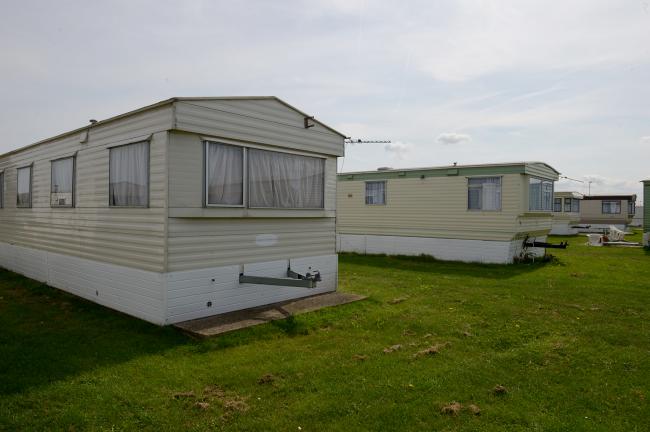
Thorney Bay caravans. Image from: https://www.braintreeandwithamtimes.co.uk/news/south_essex_news/17922590.caravans-destroyed-damaged-fire-breaks-thorney-bay-park/
Graham King has been making serious money for a long time now. In 2008 the Daily Mail reported he was paid £637,000 in part thanks to Clearsprings’ work on a Ministry of Justice scheme to offer new bail accommodation and support services to ex-prisoners.
The Subcontractor: Nationwide Accommodation Services
What does King’s company actually do for its money? Like the bigger asylum housing contractors such as Serco, it is largely just a middleman.
At the Napier barracks, in fact, day-to-day running of the camp is handled by a sub-contractor called Nationwide Accommodation Services (NACCS). How do NACCS qualify for the sensitive job of managing the care of hundreds of refugees, who have just risked their lives on a perilous journey? This is not so clear.
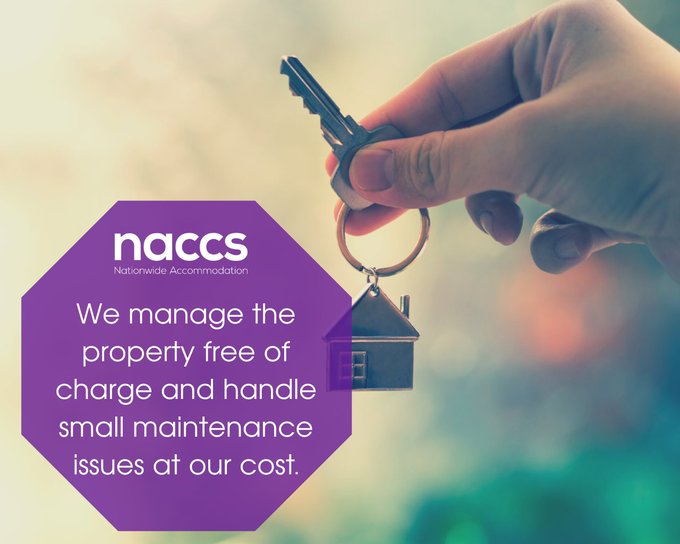
From NACCS twitter: https://twitter.com/nationwideaccs?lang=hu
NACCS is a property management firm based in east London, specialising in sourcing temporary accommodation. Its website says it aims to “‘plug the gap’ in the property market between the varying housing needs of local authorities, and landlords who seek hassle free rental solutions.” Clients named include Tower Hamlets, Newham, Southwark and Harrow councils, plus the Home Office.
Companies House records show NACCS is owned by two thirty-somethings: Waseem Tailor and Mohsin Kothia. Law Society records show Kothia is a solicitor at Blakewells solicitors in East London. He is also listed as a director of 12 companies on Companies House, including most of which appear to be real estate ventures.
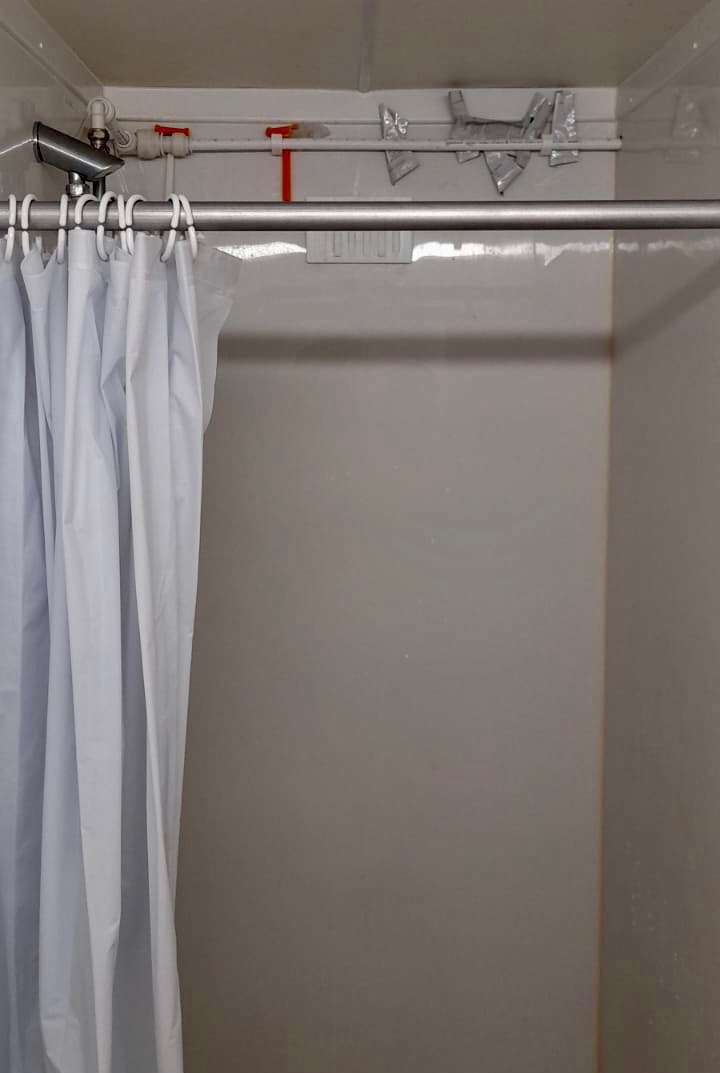
Image shows a broken shower with pipes held up with tape
The Home Office and asylum slum landlords: a rotten system
Clearsprings, and its boss Graham King, have done well as asylum housing profiteers. But this isn’t just the story of a few greedy individuals. Clearsprings is only one medium-sized player in a rotten asylum system which, at every level, puts outsourcers’ profits before the conditions of the people in its “care”. We end with a quick recap of how this system works – and how the Home Office has responded to the effects of the Covid-19 pandemic.
The UK’s approach to refugee housing has been basically the same since 1999, when the Labour government introduced its “dispersal” policy, scattering people claiming asylum into poorer regions around the UK. Like much of the UK Border Regime, asylum housing is outsourced to private companies under long-term contracts. (See The UK Border Regime chapter 5 for much more on this.)
The latest round of “Asylum Accommodation and Support Contracts” (AASC) started in September 2019, and are set to last ten years. They are divided into seven regions. Three companies won deals: Serco has two contracts, Mears Group has three, and Clearsprings the other two – South of England, and Wales. Serco and Clearsprings both also had earlier contracts from 2012-19; Mears is the new player, picking up deals lost by G4S following its latest scandal in Brook House detention centre.
(See here for a detailed guide to what the AASC contractors are supposed to provide, compiled by Asylum Matters.)
The system also involves a further contract for “Advice, Issue Reporting and Eligibility (AIRE)” services – acting as a main point of advice for refugees on their asylum claims, as well as liaising with their landlords. This £100 million deal is run by the charity Migrant Help.
In the AASC contracts, the three contractors basically act as middlemen between the Home Office and local slumlords. They own few, if any, of the properties themselves, but rent them from a second tier of private landlords. Some of these are fairly large specialist property companies – e.g., the notorious Jomast, mini-empire of Teesside multi-millionaire Stuart Monk; or Citrus Group, owners of the horrific Urban House asylum housing in Sheffield. Others could be small-scale local landlords with a handful of houses.
Asylum housing involves two stages. Refugees who have just claimed asylum, and do not have means to house themselves, are first placed in “Initial Accommodation”. This is not meant to last more than three weeks. People should then be moved to longer-term “Dispersal Accommodation” until their case is concluded. The same three contractors are in charge of both stages. Until recently, most Initial Accommodation was (at least in theory) provided in seven large accommodation centres (Urban House is one of these), supplemented by the use of hostels and hotels.
In the last year, since the new AASC contracts started last September, the system seems to have further broken down. While details are still emerging, it appears that at least some of the contractors have had major problems renegotiating their deals with local landlords, leading to a sudden shortage in housing provision in at least some areas. The contractors’ response was to turn even more to hostels and hotels – in July all three companies told a parliamentary committee that they are now using hotels for the bulk of Initial Accommodation.
Then, a few months later came the COVID-19 crisis, which pushed the government to boost Initial Accommodation for new arrivals who might otherwise been left on the streets. (This is referred to in the Home Office jargon as “Contingency Accommodation”.)
Though, as in so many other areas, what’s justified in the name of COVID-19 often makes little sense. The Home Office has argued that its contractors needed to turn to hotels in order to meet an increased demand. But in Scotland, Mears suddenly moved 300 people who had been housed in separate flats as “Initial Accommodation” and crowded them into hotels too – a bizarre decision that may have helped cause the death of Adnan Olbeh, and has been strongly criticised by the House of Commons Home Affairs Committee.
Talking about hotels, we should be clear that no five star treatment is involved. We are talking about people being dumped in the cheapest available accommodation, fed undercooked chicken and moldy bread. And we are talking about money for the likes of “Britain’s worst hotel chain” (Which? Magazine, seven years running) Britannia Hotels. This seemed convenient, at a moment when business was otherwise shut down by COVID-19 – although we don’t have information on what kind of negotiations went on between government, contractors, and hotel chains at this point.
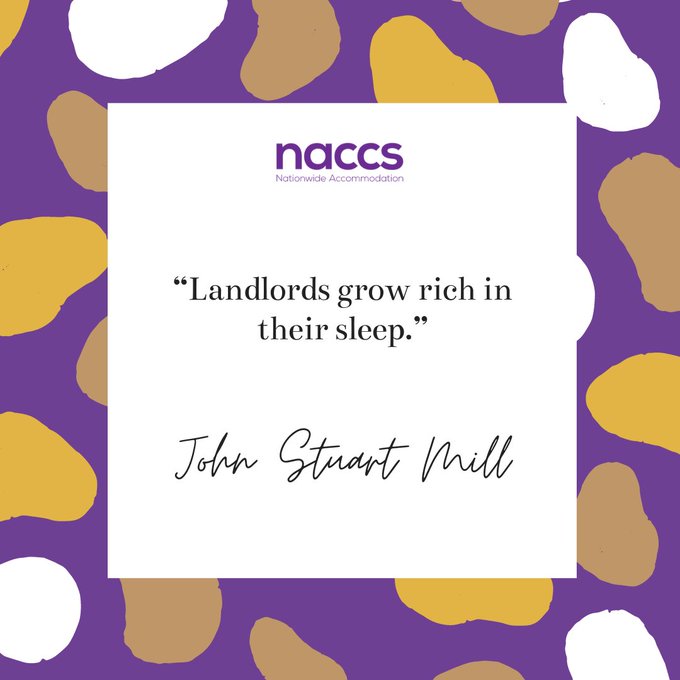
From NACCS twitter: https://twitter.com/nationwideaccs?lang=hu
It is against this background of contract cock-ups, empty hotels, and bizarre unexplained decisions by the asylum landlords, that the military bases policy appeared. As right-wing media and campaigners such as Britain First railed against putting people up in supposedly luxurious hotel accommodation, MoD barracks provided a crowd-pleasing solution.
Meanwhile, as the Home Office stumbles from one half-baked measure to the next, outsourcers such as Clearsprings keep banking their management fees.
